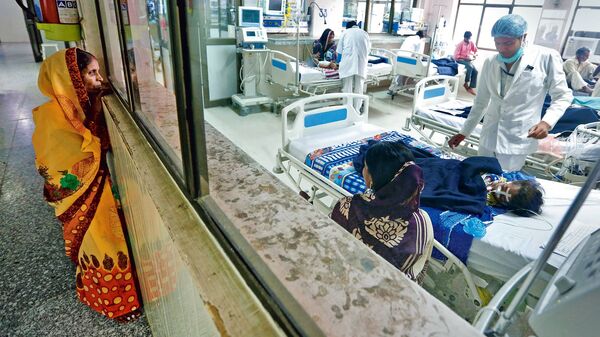India has established its digital prowess by developing digital public goods like Aadhaar, which is now central to India’s public service delivery architecture, and the Unified Payments Interface which has revolutionised daily life by enabling cashless transactions even in the most remote areas.
Digital pathways moving the needle on transformation: The government launched its flagship Ayushman Bharat Digital Mission (ABDM) two years ago, given the need for a comprehensive, integrated digital healthcare ecosystem and to move towards proactive, holistic and citizen-centric healthcare.
The Ayushman Bharat Health Account (ABHA) has created a uniform, robust and transparent framework as an identifier for patients across healthcare providers. Details and medical records of patients can be accessed digitally, and the potential of building the health profile at a population level can open doors of care continuum and quality healthcare.
Nearly 400 million ABHA IDs have been created, 30 million health records linked, and 1.75 million health professionals registered along with nearly 2 million health facilities, and the mission is gathering pace.
Platforms to lead transformation: Digital Bharat Collaborative (part of Piramal Foundation), with a presence in eight states, is a platform that marks the coming together of multi-sectoral organisations in partnership with state governments to support public state systems to improve availability, accessibility and quality of public services for all citizens by leveraging technology. Significant change efforts are already underway in Bihar and Assam, with ABDM building blocks and building digital competencies of citizens and over 5,000 state officials.
Looking ahead: While much ground has been covered in just two years, a lot more needs to be done to truly unlock the potential of digital health.
Integration of data sources: While digitisation of data is key, the integration of multiple data sources is critical. Capturing the data inputs at the source of patient engagement in the Hospital Information Systems and frontline applications as the only source of truth for all programs will ensure accuracy and transparency.
Not just tall claims: Pradhan Mantri Jan Arogya Yojana (AB-PMJAY) is one of the largest health assurance schemes globally, covering about 550 million beneficiaries—40% of India’s population. AB-PMJAY is successfully using digital public infrastructure to provide end-to-end services. This has helped citizens from vulnerable sections in getting quality services, right from admissions to treatment, discharge and ease of claims process. Seeding ABHA IDs and linking health records can further enable a seamless process.
Prioritisation of top programmes: Central government programmes need to be prioritised for the adoption of digital health accounts, where ABHA IDs can be seeded to build adaption and use cases. Authentic ABHA-linked records can really boost the delivery of programmes to address tuberculosis, hypertension and reproductive, maternal, child and adolescent health that play a key role in impacting India’s health indicators.
Immediate adoption of ABDM and health records of over 200 million citizens enrolled in central health programmes like ESIC, CGHS, and in railways and defence will boost the coverage of use cases and build a strong repository of services.
Setting examples with data anonymity: With the digitisation of data comes increasing concern about data privacy. To allay these concerns, consent mechanisms and anonymization (delinking personal identifiable information, or PII) need to be mandated to access data for any clinical, research or program decision purposes. This will enable India to become a role model on data privacy and governance.
The government will be able to better track and stem life-threatening illnesses like tuberculosis and breakouts of deadly viral epidemics like measles and conjunctivitis, while policymakers would be armed with relevant data to chart robust policies for prevention and treatment without personal details of patients being revealed.
Confidentiality and Confidence go hand in hand: The Supreme Court of India declared the right to privacy as a fundamental right in 2017, after which the Data Privacy Bill was introduced and now the Digital Personal Data Protection Bill 2022 has been drafted.
In the meantime, as a measure to build confidence and trust of users, under ABDM Health Data Management Policy, ABDM has already adopted certain principles to govern the use, collection and processing of personal, sensitive data. This is a step in the right direction to ensure effective guardrails for data privacy.
Every life matters: While some schools of thought may see the progress of digital technology as detrimental to privacy and inclusion, ABDM and platforms like Digital Bharat Collaborative have proven to be valuable assets that are touching lives in a balanced and responsible manner by keeping the citizen at the centre of every solution, such that will truly build a strong Bharat in the years to come.
Swati Piramal is vice chairperson, Piramal Group, and Pallav Patankar is director, Piramal Foundation
Download The Mint News App to get Daily Market Updates.
More
Less
#Digital #technology #India #transform #public #healthcare
